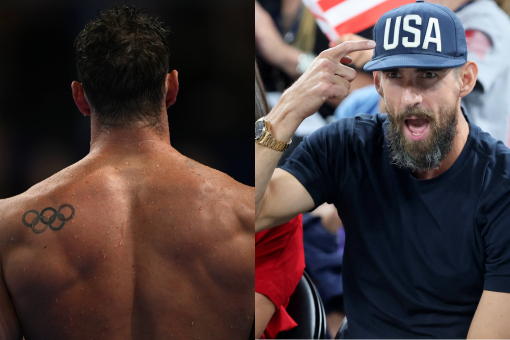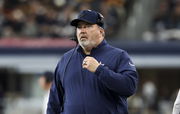
Imago
Ryan Murphy and Michael Phelps/ Image Source: Imago

Imago
Ryan Murphy and Michael Phelps/ Image Source: Imago
“We’re moving way too slowly when it comes to ‘righting the ship,’ that is College Swimming,” Kyle Sockwell, founder of heatoneswimclub.com, dropped a long tweet over collegiate swimming on August 29. He wanted changes, pointing out: budgets were shrinking, programs being cut, and coaching staffs being reduced. “We need to start modernizing, quickly, if we want to retain any sliver of what we’ve become used to over the last few decades,” Sockwell continued. And now, Michael Phelps’ Olympic teammate has responded to this.
Watch What’s Trending Now!
“Do what you’ve always done, get what you’ve always gotten,” tweeted Ryan Murphy today in reply to that. He added, “It’s well past time to try something different in swimming. We don’t need to reinvent the wheel here. Nearly every major sport ends its season with a bracket-style tournament.” Well, in the United States, a bracket-style tournament has become integral to the sports culture.
NBA and NHL feature 16-team, best-of-seven playoff series, while NFL has a 14-team single-elimination playoff leading to the Super Bowl. MLB’s postseason involves 12 teams progressing through the Wild Card, Division, and Championship Series to the World Series. And collegiate basketball uses the 68-team, single-elimination NCAA “March Madness” tournament. But swimming does not.
ADVERTISEMENT
NCAA swimming works a bit differently from typical bracket-style sports.
Do what you’ve always done, get what you’ve always gotten.
It’s well past time to try something different in swimming. We don’t need to reinvent the wheel here. Nearly every major sport ends its season with a bracket-style tournament.
Can someone please test swimming’s version… https://t.co/gpGusXValm
— Ryan Murphy (@ryan_f_murphy) August 29, 2025
Teams facing off in win-or-go-home games, swimmers compete in individual races where the fastest times earn points for their team. Every swimmer’s performance adds to the team’s total score. So even if one race doesn’t go perfectly, the team can still succeed overall. But Ryan wants the bracket-style tournament to be there in swimming.
ADVERTISEMENT
Michael Phelps’ former teammate continued, “Can someone please test swimming’s version of this? Start with 8 or 12 teams. Run head-to-head dual meets over 3 days. Single elimination. One winner.” Well, efforts are being made.
Georgia Tech is set to host an eight-team knockout-style dual meet tournament on October 17–18, 2025, featuring teams like NC State, Auburn, Minnesota, Georgia, Army, Florida State, and George Washington.
ADVERTISEMENT
Meanwhile, Phelps himself had spoken up about where swimming is headed.
Michael Phelps’ Rant on swimming’s future
The most decorated swimmer of all time made a 5-page Instagram post 2 weeks ago, speaking about the future of swimming in the USA. He made it clear that his critique targeted leadership outside the pool, not the athletes themselves. The Olympian spoke of how Team USA captured just 44% of medals at the 2024 Paris Olympics, the lowest since 1988, and described seeing “too many teammates struggle to compete in a sport they love without the support they need.”
ADVERTISEMENT
He wrote, “Swimming, to me, was always about more than just medals – it’s supposed to be an environment that builds champions in and out of the pool. As a Dad to four young boys, it pains me to say that I’m not sure if I’d want my sons to be a part of this sport at a competitive level. Yes, swimming changed my life, but it also caused a lot of heartache, and its current state makes me both sad and angry.”
And while Phelps referenced money as being a factor in USA Swimming’s decline, he accused the organization of “poor operational controls and weak leadership.” But he wasn’t just pointing fingers; he had solutions.
Top Stories
PGA Tour Pro Loses His Cool After Being Denied Entry Into WM Phoenix Open Field

Giannis Antetokounmpo All but Confirms Warriors Trade With 6-Figure Decision: NBA Rumor

Brooks Koepka’s Unscathed Return Upsets Viktor Hovland as PGA Tour Pro Refuses to Hold Back

U.S. Senator Announces Bad News For NFL Fans After Donald Trump’s Ruling on ESPN’s Billion-Dollar Takeover

Josh Allen’s Former Coach Breaks Silence on Buffalo Exit as Joe Brady Assembles Bills’ Staff

Mike McCarthy Receives Bad News as Aaron Rodgers’ Return to Steelers Faces Major Setback

Michael Phelps urged a full, independent review of USA Swimming’s leadership and operations, calling for complete transparency so the organization could be held accountable. He stressed the need to make athlete support more straightforward and genuinely athlete-focused, noting that while resources exist, they often don’t reach the swimmers who need them. Phelps also highlighted the importance of rebuilding the sport from the ground up, growing participation at the grassroots level, and finding new ways to nurture swimming’s future.
ADVERTISEMENT
All that with the words, “My door is open and there is work to be done.”
ADVERTISEMENT
ADVERTISEMENT
ADVERTISEMENT